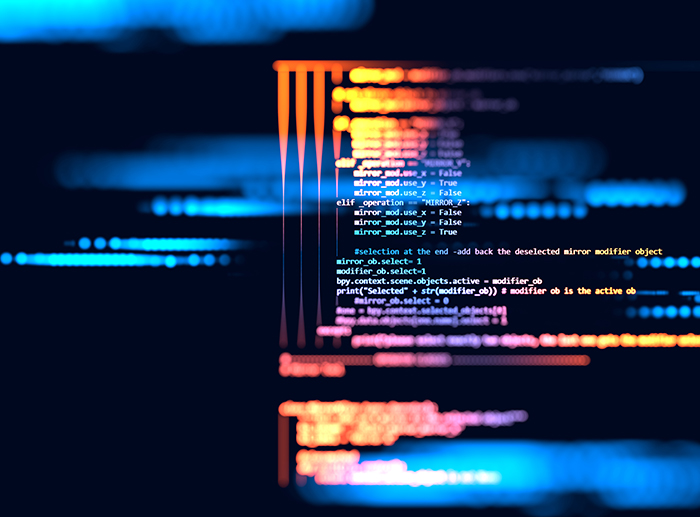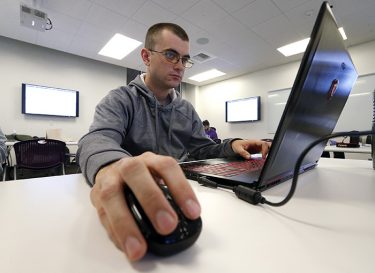
By Lana Sweeten-Shults
GCU News Bureau
App-making machine Mark Mott sprinted at an Olympic pace through his four years of computer programming at Grand Canyon University.
The spring 2019 computer programming graduate created a weather app that’s able to glean information from a credit card-size computer called a Raspberry Pi. He developed a web version of a game called Breakout using a Raspberry Pi as a controller and curated a Minesweeper-inspired game on the web. Then there’s the artificial intelligence application, much like Alexa, he gave a good polish to in Mark Reha’s capstone class.

Like his fellow computer programmers, Mott didn’t while away his time at GCU. By the time they graduated last week, computer programming majors entered the job market with quite the hefty app arsenal.
“I’ll probably have five apps and projects ready to show by the time I graduate,” Mott said during his capstone class in the Technology Building.
And that’s pretty typical.
“Every class has a project, so by the time they’re done, they’ve probably built a dozen applications, either by themselves or in teams of two – and then their capstone project is on top of that, which is a yearlong venture,” said Reha, Computer Programming Faculty Lead.
Take recent computer programming graduates Matthew Mitar and Joey Alexander’s capstone project: a system to more accurately track beverage inventory to decrease waste in restaurants and bars. A device will measure the weight differences before a bottle is picked up and after it’s placed back down. That device will communicate with a server, then an app will have access to that data.
Mitar said he started writing apps immediately after arriving at GCU. “In my first class here, we went straight into programming. I think that’s something a lot of these guys resonate with — the hands-on practice vs. just theory.”
Not that students don’t study theory — they do.
“They build their first web application their first semester here, and that goes on for four years, basically,” Reha said.
Computer Programming/Computer Science instructor Jevon Jackson said, “All of our assignments in all of our classes, the purpose is for you to build something, so you get the hands-on, ‘Oh, I’ve done this before, I’ve built a website before, I know how to use the Cloud.’ … So you don’t have to be taught those things going into an employer, which makes you more competitive than your counterparts coming out of college.”
It isn’t the only thing GCU does differently in computer programming, which debuted in 2015 — a technology and science boom year that also featured the launch of the biomedical, mechanical and electrical engineering programs and marked the dawn of an incredible four-year expansion at GCU.
Few colleges, if any, break computer programming into its own discipline, separate from computer science.
“Nobody does,” said Computer Programming/Computer Science Assistant Professor Lydia Fritz.
While computer science is a theory-, science- and math-heavy approach to how information is computed, computer programming is more of a technical, practical discipline, rather than a science, that’s focused on current technologies. Think coding and more coding.
Recent graduate Brendan Brooks changed his major to computer programming because of the uncommon way GCU teaches it.
“I realized once I saw it that no other school had that (a separate computer programming major),” Brooks said. “Computer science never interested me. It was a lot of theory and concepts, but when I looked at what the computer programming degree does …”
Reha added, “Here we have a nugget right in the palm of our hand because there’s no programs that I’m aware of – bachelor programs – in the entire United States that has this focus.”
Beyond churning out a slew of programs, students learn more languages than the typical computer science or software engineering majors.
“You get maybe two, but in this program, students get three primary programming languages,” Reha said – Java, C# (C Sharp) and PHP, all widely used in the industry.
Students tend to be adept at even more than those three.
“How many would I confidently say I know?” Brooks mentally counted. “Five or six.”
Knowing those heavily used languages “is a HUGE advantage for us,” said computer programming graduate Aaron Ross. The company he works for, Scottsdale-based Idea Spring, wants to hire more job-ready graduates like Ross, and they’re seeking that talent at GCU.
Ross noticed when Idea Spring made it a point to contact Tacy Austin, Career Services Student Success Specialist, and said, “We want to be at your job fair.”
“It’s cool to see my company coming to GCU to look for students,” he said.
On top of that trio of programming languages, faculty teach four frameworks based on those languages – Laravel PHP, Enterprise Java, .Net (“dot net”) and Spring Framework.
“So it’s not just learning a programming language,” Reha said. “We then have the students apply that and use that to program in the four — soon to be the five — most popular web frameworks used in the industry. These are in all pretty high demand and used everywhere.”
He added, “You will not find that at any other university, not only the breadth of the programming language but the depth that we then apply that across those four web development stacks.”
What that means for students is they’re job-ready, oftentimes even before they graduate.
Brooks said, “Because I was taught so much so quickly from having all this hands-on experience instead of having all this theory, I was able to get a job and beat out a lot of other people.”
Reha said, “To prove the value of our program, it’s not uncommon for our students to get internships in their sophomore year; they are that prepared to be able to go into the industry and contribute, and then when they get two more years under their belts, with capstone projects, anybody that’s applying themselves in this program will undoubtedly not have a problem getting a job. No way.”
Ross describes the program as “a hidden treasure” since it is still so new. The University’s first-ever computer programming grads walked the commencement stage just last year.
“We have the hidden opportunity to surprise people – ‘Oh! Grand Canyon University? What’s that?’ Well, we know all the languages you need, so that’s kind of cool,” Ross said.
Reha said the faculty is eager to get the word out about the University’s stellar computer programming track. “It’s a beautiful, beautiful program,” he said.
That beauty isn’t lost on Fritz. She speaks poetically about the University being at the forefront of computer programming education as its first graduates start to filter into the industry:
“I think GCU is going to, very quickly in this area, build a strong reputation for its computer programming students. When they graduate, they’re going to be good hires for people, and that snowballs. The word will be out when they’re looking for somebody. THIS is where they’re going to come.
“I think we’re going to shine in this area,” she said with a sparkle in her eye. “It’s exciting.”
****
Related content:
GCU Today: "Engineering, tech students showcase their ingenuity"









































































